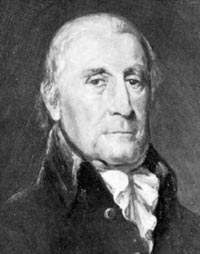Francis Lewis
Francis Lewis | |
|---|---|
 | |
| Born | March 21, 1713 |
| Died | December 31, 1802 (aged 89) |
| Resting place | Trinity Church Cemetery, New York City |
| Occupation(s) | Merchant, politician |
| Known for | signer of the United States Declaration of Independence |
| Signature | |
 | |
Francis Lewis (March 21, 1713 – December 31, 1802) was a signer of the United States Declaration of Independence as a representative of New York.
Biography
Born in Llandaff, Wales, he was the only child of Morgan Lewis and Anne Pettingale.[1][2] His father and maternal grandfather were both clergymen. He was educated in Scotland[citation needed] and attended Westminster School in England. He entered a mercantile house in London, then moved to Whitestone, New York in 1734. He married Elizabeth Annesley, the younger sister of his business partner, on June 15, 1745. He was taken prisoner while serving as a British mercantile agent in 1756 and sent to France for imprisonment. On his return to America, he became active in politics.
He was a member of the Committee of Sixty, a member of the New York Provincial Congress, and was elected a delegate to the Continental Congress in 1775. In 1778, he signed the United States Articles of Confederation. From 1779 to 1780, Lewis served as the Chairman of the Continental Board of Admiralty.
His home, located in Whitestone, in Queens, New York, was destroyed in the American Revolutionary War by British soldiers, who also arrested his wife, Elizabeth, and denied her a change of clothing or adequate food for weeks while in captivity. Her hardships in captivity ruined her health and led to her death in 1779 after being released in a prisoner exchange.[3][4]
He helped his son Morgan Lewis open a dry goods business named Francis Lewis and Son. Morgan served in the army during the Revolutionary War and later held many offices in New York State, including Governor.
Lewis died on December 31, 1802, although his memorial in Trinity Church Cemetery gives his year of death as 1803.
Legacy

In Queens, New York, Francis Lewis High School and P.S. 79 "The Francis Lewis School" are named after Lewis. The Francis Lewis Boulevard, which locals tend to refer to as "Franny Lew," stretches almost the entire north/south length of the borough. Francis Lewis Park is located under the Queens approach of the Bronx Whitestone Bridge. A Masonic Lodge, Francis Lewis #273, is located in Whitestone.
References
- ^ "LEWIS, Francis, (1713 - 1803)". The Biographical Dictionary of the United States Congress.
- ^ Williams, Prof. David. Welsh Biography Online. "Francis Lewis (1713–1802)" National Library of Wales (2009) Accessed May 13, 2013. [1]
- ^ "Francis Lewis, New York". Signers of the Declaration. National Park Service. Retrieved 18 January 2016.
- ^ Hirshon, Nicholas (July 3, 2011). "Francis Lewis' descendants want tribute to Queens signer of Declaration of Independence". New York Daily News. Retrieved 18 January 2016.
External links
- 1713 births
- 1803 deaths
- People from Llandaff
- American Episcopalians
- American people of Welsh descent
- Continental Congressmen from New York (state)
- 18th-century American politicians
- Members of the New York Provincial Congress
- Signers of the Articles of Confederation
- Signers of the United States Declaration of Independence
- People educated at Westminster School, London
- People of colonial New York
- Welsh emigrants to the United States
- Welsh politicians
- Burials at Trinity Church Cemetery
